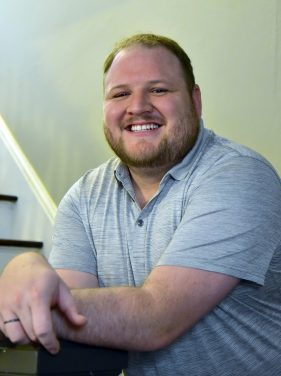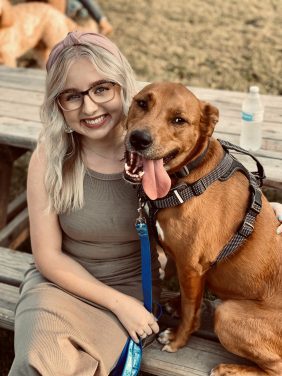Published on
Updated on
Published 12/23/2023
Story contact: Nicholas Childress, CVMMarCom@missouri.edu
The University of Missouri College of Veterinary Medicine is celebrating the first two students to graduate from the Bachelor of Science in Veterinary Technology Program since its inception in 2021.
The demanding work that veterinary technicians do is crucial to veterinary clinic operations. However, there is a nationwide shortage of technicians often leaving clinics short staffed. With that in mind, the MU CVM developed an online bachelor’s completion program to assist technicians advance their careers while allowing them to continue working. The program and its director, Cindy Cravens, DVM, set out to give students the skills needed for increased responsibility, career advancement, and a rewarding future in a fast-paced work environment.

Cravens developed articulation agreements with community college veterinary technician programs in Missouri and around the country. Gary Anderson, a Pennsylvania native and one of the two graduating students, joined the program in the spring of 2022 after his alma mater, Johnson College of Technology in Scranton, Pennsylvania, contacted him about it.
“They mentioned that (Mizzou) would take every credit that I had completed,” said Anderson. “I reached out to Cindy Cravens, and she was super helpful in discussing all of my past credits.”
When deciding whether the program was something Anderson needed, he quickly realized that it would help him take the next step in his career. “I didn’t want to be at a clinical practice forever, and it’s my goal to go into academia and become an educator,” said Anderson. “I wanted something that would give me a better foundation for the students of tomorrow. Having an associate degree was super helpful for practice, but I think having that bachelor’s degree behind me, all the leadership training, and more in-depth education we received, is going to make it easier for me to explain topics to students as they’re learning.”
Anderson has already signed an offer with his alma mater to begin teaching an online course in medical mathematics in the spring of 2024.
Jamie Ottinger, a resident of St. Louis, is the other student graduating from the BSVT Program this semester. Ottinger began the program in January of 2021 when she was searching to take a next step in her professional career.
“I was questioning if I could stay in the field,” said Ottinger. “I’m at a point in my life where I want more for myself, but being a technician, you sometimes get to a point where you don’t know what’s next. To have a bachelor’s degree in veterinary technology is huge and I think it will be beneficial in the future with the way that technology keeps developing in veterinary medicine.”

Ottinger says the journey was a challenge for her but is proud of what she has accomplished. “The past two years were probably the most challenging, while juggling a full-time job, school, and trying to maintain a personal life,” she said. “These years also brought the most change in my personal life but motivated me to do better. I won’t deny that there were times I wanted to give up, but I’m thankful I didn’t. I hope this program inspires other technicians the way it inspired me.”
While Ottinger doesn’t have any immediate post-graduation plans, she is excited about the opportunities that her new degree may offer her and other veterinary technicians in the future. “I think this is a huge step in the right direction for veterinary medicine,” said Ottinger. “The turnover rate for technicians is high, but I think this will make turnover rates lower and our empathy for patients higher. This kind of program will lead to a bright future for all techs.”
Anderson and Ottinger say they feel honored to be the first graduates of the BSVT program. “It means a lot to me,” said Anderson. “I had a lot of things change in my life, so I was doubting myself and questioning things. It really has given me that final push to know that I’m good enough in a lot of ways. Being one of the first graduates means that I’ve done it, and others will do it. We’re setting a precedent for the future of our field and the future of technologists.”